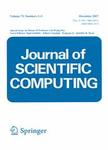版权所有:内蒙古大学图书馆 技术提供:维普资讯• 智图
内蒙古自治区呼和浩特市赛罕区大学西街235号 邮编: 010021

作者机构:Northwestern Polytech Univ Sch Math & Stat Xian 710129 Peoples R China Northwestern Polytech Univ Key Lab Complex Sci Aerosp MOE Xian 710129 Peoples R China MIIT Key Lab Dynam & Control Complex Syst Xian 710129 Peoples R China Renmin Univ China Ctr Appl Stat Sch Stat Beijing 100872 Peoples R China Beijing Adv Innovat Ctr Future Blockchain & Privac Beijing 100191 Peoples R China Louisiana State Univ Dept Math Baton Rouge LA 70803 USA
出 版 物:《JOURNAL OF SCIENTIFIC COMPUTING》 (J Sci Comput)
年 卷 期:2025年第102卷第3期
页 面:1-33页
核心收录:
学科分类:08[工学] 0701[理学-数学] 0812[工学-计算机科学与技术(可授工学、理学学位)]
基 金:National Natural Science Foundation of China
主 题:Saddle-point problem Asymmetric forward-backward-adjoint algorithm Convergence and complexity Image processing
摘 要:The convex-concave minimax problem, also known as the saddle-point problem, has been extensively studied from various aspects including the algorithm design, convergence condition and complexity. In this paper, we propose a generalized asymmetric forward-backward-adjoint algorithm (G-AFBA) to solve such a problem by utilizing both the proximal techniques and the extrapolation of primal-dual updates. Besides applying proximal primal-dual updates, G-AFBA enjoys a more relaxed convergence condition, namely, more flexible and possibly larger proximal stepsizes, which could result in significant improvements in numerical performance. We study the global convergence of G-AFBA as well as its sublinear convergence rate on both ergodic iterates and non-ergodic optimality error. The linear convergence rate of G-AFBA is also established under a calmness condition. By different ways of parameter and problem setting, we show that G-AFBA has close relationships with several well-established or new algorithms. We further propose an adaptive and a stochastic (inexact) versions of G-AFBA. Our numerical experiments on solving the robust principal component analysis problem and the 3D CT reconstruction problem indicate the efficiency of both the deterministic and stochastic versions of G-AFBA.